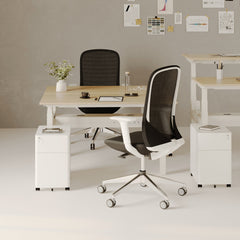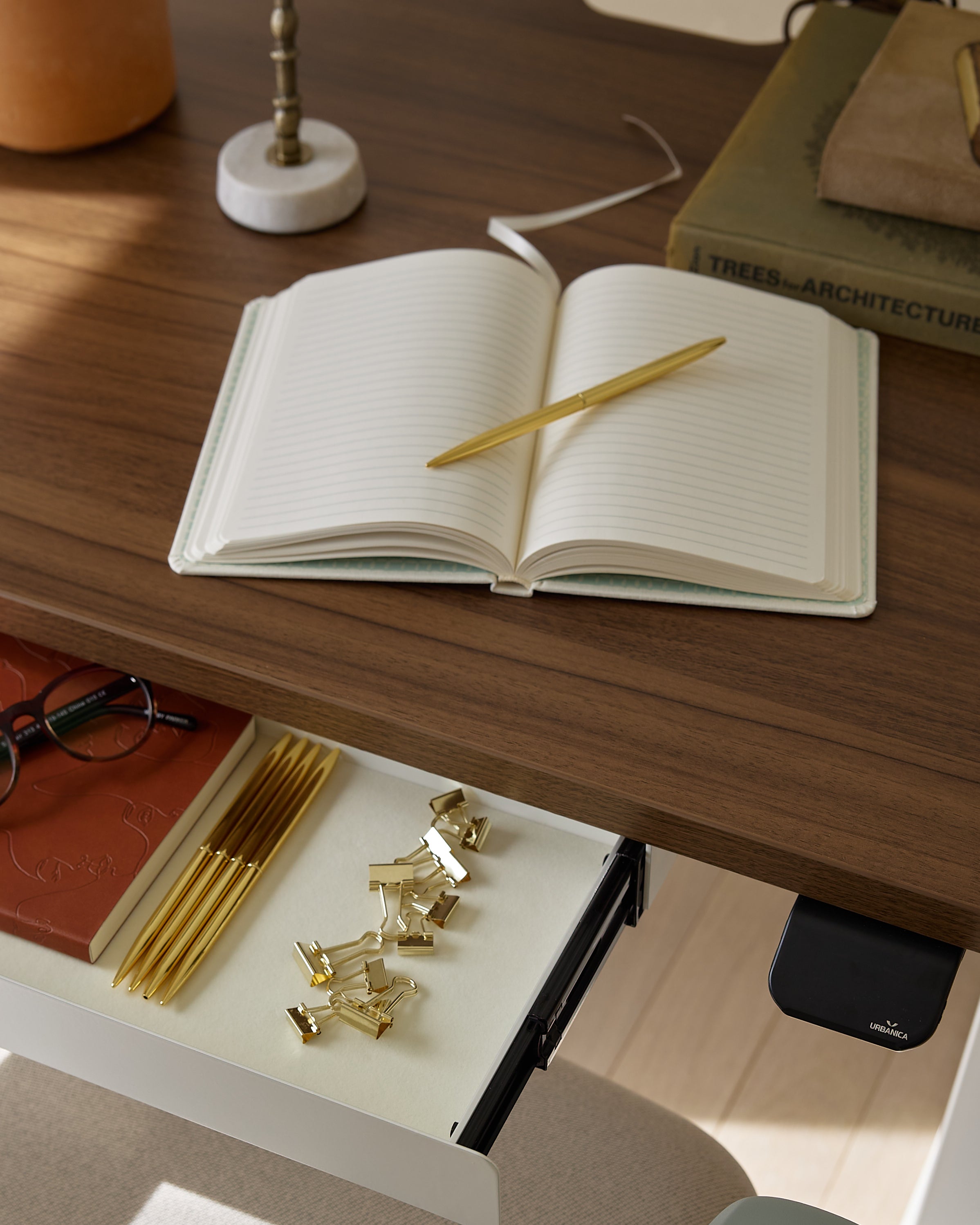Get 10% off your first order
Find the office furniture that’s designed to match your style, comfort, and needs perfectly. Subscribe
Working Together, From Home: Designing a Space That Connects

Visit quiz page to see how we makes it easy to create an inspiring workplace


Every workspace tells a story. From the way your desk is organized to the materials you choose, your setup quietly communicates how you approach your day. Your office table isn’t just where you work—it’s where your ideas come to life.
Selecting a table style that fits your personality can improve comfort, motivation, and even how inspired you feel at work. Whether you thrive in structured spaces or creative chaos, there’s a design that mirrors your mindset.
Let’s explore how your workspace can speak your language—through the shape, texture, and tone of your table.
Your workspace mirrors your inner world. A minimalist might choose clean lines and neutral tones, while a visionary thinker leans toward expressive designs and bold materials. Every choice—from shape to finish—creates a subtle link between emotion and environment.
|
Personality Type |
Table Style |
Defining Feature |
|
Minimalist |
Streamlined, monochrome design |
Calm and clutter-free focus |
|
Innovator |
Unique shapes, mixed materials |
Stimulates creativity |
|
Organizer |
Multi-drawer, structured layout |
Practical and efficient |
|
Visionary |
Spacious, collaborative setup |
Encourages brainstorming |
Your table is more than décor—it’s an expression of how you work and what motivates you most.
Minimalists thrive on simplicity. For them, less is more—both visually and mentally. A design with subtle detail and no excess promotes calm and focus throughout the day.
Open space encourages concentration.
Simple materials create a timeless look.
Neutral colors complement any interior.
Easy-to-clean surfaces maintain order effortlessly.
A minimalist setup pairs beautifully with adjustable options like the Small Standing Desk Los Angeles, blending functionality with sleek design.
Practical personalities value durability and performance over decoration. An industrial layout, with sturdy metal legs and wood surfaces, creates a workspace that’s both efficient and grounded.
Strong materials like steel and oak.
Straightforward layouts that prioritize comfort.
Minimal accessories that reduce distraction.
Ample storage space for essentials.
Pragmatists prefer furniture that feels like an investment—useful, dependable, and timeless.
Creative personalities need a space that moves with their thoughts. Unique shapes, layered textures, and flexible surfaces help turn inspiration into action.
Incorporate a balance of color and texture.
Use multi-level surfaces for sketching or note-taking.
Keep decor meaningful but minimal.
Add movable pieces for fluid layouts.
A standing desk setup supports spontaneous thinking by keeping energy high and posture flexible.
Organized thinkers find comfort in structured design. Classic wooden desks with drawers and detailed craftsmanship help maintain workflow while projecting quiet authority.
Designated zones for devices and stationery.
Drawer systems for categorized storage.
Balanced lighting that complements warm wood tones.
Neat cable management for a tidy appearance.
An office desk with built-in organization transforms discipline into elegance—perfect for those who find focus in order.

Some personalities are energized by collaboration. Large table designs encourage communication, shared projects, and social connection in the workplace.
Wide surfaces make room for teamwork.
Open layouts encourage visibility and idea sharing.
Individual zones support personal comfort within collaboration.
Clean design maintains a professional aesthetic.
A quad workstation balances privacy and proximity, giving teams the freedom to interact without disrupting focus.
The tone and texture of your desk influence how you feel each time you sit down to work. Natural materials bring calm, while modern finishes energize your space.
|
Material |
Personality Match |
Emotional Effect |
|
Wood |
Grounded and traditional |
Warm and stable |
|
Glass |
Visionary and expressive |
Open and bright |
|
Metal |
Pragmatic and efficient |
Modern and sharp |
|
Laminate |
Minimalist and adaptable |
Clean and practical |
Choosing the right finish gives your workspace its personality as much as you do.
A workspace that reflects your style also enhances your output. Feeling “at home” at your desk naturally increases focus, confidence, and consistency.
Choose furniture that complements your daily habits.
Keep colors that match your emotional rhythm.
Add a small touch of personality—a photo, plant, or notebook.
Maintain balance between inspiration and function.
The most productive spaces are personal spaces—designed with care and purpose.
Your office design is more than aesthetic—it directly shapes how you feel and perform. A growing body of research explores how design elements like layout, color, and personalization influence behavior and emotional well-being. One workspace psychology study reveals that thoughtful workspace personalization improves comfort, reduces stress, and encourages consistent motivation.
Visual order enhances focus and decision-making.
Personalized layouts create a stronger sense of control.
Natural textures and warm tones stabilize the mood.
Clutter-free spaces reduce anxiety and cognitive overload.
When your workspace aligns with your emotions and habits, it becomes more than a place to work—it becomes a reflection of balance, creativity, and confidence.

No two days feel the same, and your desk should keep up. Modular and height-adjustable designs encourage movement, flexibility, and long-term comfort.
Alternate between sitting and standing throughout the day.
Rearrange elements to refresh your perspective.
Add adjustable lighting for eye comfort.
Keep portable storage for shifting needs.
Dynamic design reflects a dynamic mind—always evolving, always ready.
A well-designed shared workspace can express collective energy. A workstation desk layout, for example, communicates openness, teamwork, and creativity—values that define many modern offices.
Encourages community without sacrificing comfort.
Supports multiple workstyles under one design.
Keeps aesthetics cohesive while allowing individuality.
Balances energy and structure seamlessly.
When a shared space reflects shared goals, the office becomes an extension of the team’s identity.
Your desk isn’t just where work happens—it’s where identity and inspiration connect. Whether you prefer clean lines or creative chaos, your table’s design has the power to center your focus and reflect who you are.
Notice which materials and shapes feel natural to you.
Choose a quality that lasts as long as your ambition.
Keep your space flexible but intentional.
Let your desk reflect your pace, purpose, and personality.
The right workspace doesn’t just mirror your personality—it amplifies it, turning daily work into a form of self-expression.

Working Together, From Home: Designing a Space That Connects

Simplify to Focus: How Minimalist Furniture Nurtures a Clear Mind

How to Make a Desk Setup Feel Like Home
Get 10% off your first order
Find the office furniture that’s designed to match your style, comfort, and needs perfectly. Subscribe
Leave a comment